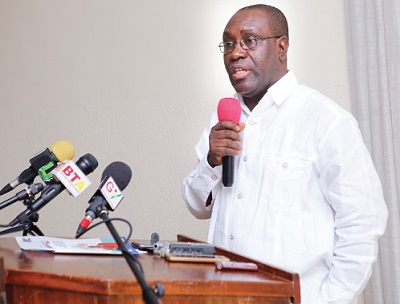
Let’s avoid repetition of budgetary crisis
Ghana has experienced fiscal slippages in election years in the Fourth Republic.
The fiscal deficit has increased sharply above five per cent of gross domestic product (GDP) in all but the 2004 election year since 2000.
The largest fiscal deficit of 11.5 per cent of GDP was recorded in 2012, a development that forced the government to adopt austere economic measures to correct the imbalances.
Between 2007 and 2012, public expenditure rose rapidly because of the increased spending on wages due to the introduction of the single spine salary structure, which standardised the public sector pay scale across government employees and grade levels from 20 per cent to 30 per cent of GDP.
Next year is another election year and, as has become the norm, we tend to overspend during the period for political expediency.
Invariably, this does not inure to the sustainable development of the nation.
Even though assurances are given by governments that they will stick to the budget, they always spend beyond their means.
This pattern of election year slippages always send the country multiple steps back in its economic development because the people suffer, as they are denied the basic infrastructure needs that budgets promise to deliver.
It is for this reason that stakeholders, such as the Trades Union Congress (TUC), have cautioned the government against any pressure to overspend on vote-winning projects as the country enters into an election year.
In its 13-page input for the 2020 Budget, the TUC said it would not hesitate to hold the government “to its own promise that it will not repeat this mistake”.
The TUC’s concern follows predictions by the International Monetary Fund (IMF) and the Economic Intelligence Unit (EIU) of the tendency by the government to overspend in the run-up to the 2020 elections.
While the IMF had advised the government to craft and execute the 2020 Budget carefully to avoid reversing the gains made in stabilising the economy, the EIU anticipated that the government would record a 5.5 per cent budget deficit, come 2020, even though it had passed the Fiscal Responsibility Act last year aimed at limiting future budget deficits to a maximum of five per cent of GDP.
The Daily Graphic, however, notes that the government passed the Fiscal Responsibility Act and set up the Fiscal Council to advise the President on fiscal choices to ensure discipline.
It is also heartwarming to hear that President Nana Addo Dankwa Akufo-Addo has urged the Minister of Finance and all ministers to collaborate to ensure that there are no fiscal slippages in order to consolidate the economic gains chalked up these past three years.
For us, passing the act is a positive commitment and, hopefully, the country can avoid a repetition of the budgetary crisis that led the erstwhile Mahama government to go to the IMF for emergency assistance in 2015.
Although these laudable measures to contain the fiscal slippages in election years exist, the Daily Graphic calls on managers of the economy to adhere strictly to the budget estimates and their implementation, since anything short of that will be disappointing.
For the Ghana Beyond Aid agenda to materialise, fiscal discipline and ensuring consistency and sustainability in economic policies and programmes are key ingredients.
The credibility that comes with this is the alluring flavour that will attract the confidence of the international community to turn attention to Ghana as an investment destination.
The Daily Graphic calls on all Ghanaians to put their shoulders to the wheel in building a prosperous economy that will bring shared growth, prosperity and financial independence to all. This is the only way we can leave a good legacy for future generations.
